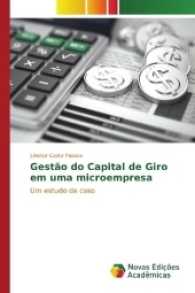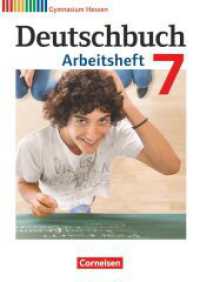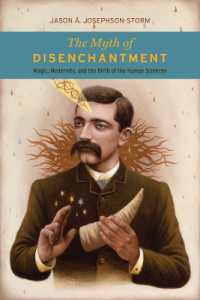Full Description
What is opera? Contributors to The Oxford Handbook of Opera respond to this deceptively simple question with a rich and compelling exploration of opera's adaption to changing artistic and political currents. Fifty of the world's most respected scholars cast opera as a fluid entity that continuously reinvents itself in a reflection of its patrons, audience, and creators. The synergy of power, performance, and identity recurs thematically throughout the volume's major topics: Words, Music, and Meaning; Performance and Production; Opera and Society; and Transmission and Reception. Individual essays engage with repertoire from Monteverdi, Mozart, and Meyerbeer to Strauss, Henze, and Adams in studies of composition, national identity, transmission, reception, sources, media, iconography, humanism, the art of collecting, theory, analysis, commerce, singers, directors, criticism, editions, politics, staging, race, and gender. The title of the penultimate section, Opera on the Edge, suggests the uncertainty of opera's future: is opera headed toward catastrophe or have social and musical developments of the last hundred years stimulated something new and exciting, and, well, operatic? In an epilogue to the volume, a contemporary opera composer speaks candidly about opera composition today.
The Oxford Handbook of Opera is an essential companion to scholars, educators, advanced students, performers, and knowledgeable listeners: those who simply love opera.
Contents
Introduction
Helen M. Greenwald
PART I WHAT IS OPERA?
1. What is Opera?
Tim Carter
2. Genre
Emanuele Senici
3. Musical Theater(s)
Derek B. Scott
4. Operatorio?
Monika Hennemann
5. The Concept of Opera
Lydia Goehr
PART II WORDS, MUSIC, AND MEANING
The Libretto and the Score
6. Oft-Told Tales
Vincent Giroud
7. The Language of National Style
Marina Frolova-Walker
8. Musical Dramaturgy
Damien Colas
9. Versification
Andreas Giger
10. The German Libretto of the Early Nineteenth Century
John Warrack
11. Analysis
William Drabkin
Humanism, Verisimilitude, and Voice
12. Opera between the Ancients and the Moderns
Wendy Heller
13. Verisimilitude
Thomas Betzwieser
14. Voice
Michal Grover-Friedlander
15. Characterization
Julian Rushton
16. Meaning
Lawrence Kramer
PART III PERFORMANCE AND PRODUCTION
17. Divas and Divos
Hilary Poriss
18. Castrato Acts
Martha Feldman
19. Rehearsal Practices
Mark Everist
20. Acting
Simon Williams
21. The Chorus
Ryan Minor
22. The Orchestra
Alessandro Di Profio
23. Dance
Linda J. Tomko
24. Production Aesthetics and Materials
Katherine Syer
25. Costumes
Veronica Isaac
26. Regietheater/Director's Theater
Ulrich Müller
27. Historically Informed Performance
Mary Hunter
PART IV OPERA AND SOCIETY
28. Opera Composition and Cultural Environment
Marianne Betz
29. Patronage
Valeria De Lucca
30. Audiences
Georgia Cowart
31. Autographs, Memorabilia, and the Aesthetics of Collecting
Daniela Macchione
32. Politics
Marc A. Weiner
33. Religion
Jesse Rosenberg
34. Race and Racism
John Graziano
35. Gender
Alexandra Wilson
36. Exoticism
W. Anthony Sheppard
37. Censorship
Francesco Izzo
PART V TRANSMISSION AND RECEPTION
38. How Opera Traveled
Louise K. Stein
39. The Operatic Canon
James Parakilas
40. Critics
Paul Watt
41. Soundings Offstage
Thomas Christensen
42. Visual Media
Marcia J. Citron
43. Operatic Images
Helen M. Greenwald
44. Sources
Linda B. Fairtile
45. Reconstructions
Charles S. Brauner
46. Editing Opera
Patricia B. Brauner
47. Writing the History of Opera
Philip Gossett
PART VI OPERA ON THE EDGE
48. 1900-1945
Joy H. Calico
49. After the Canon
Robert Fink
EPILOGUE
50. Composing Opera
Jake Heggie
Index of Musical Works
General Index








